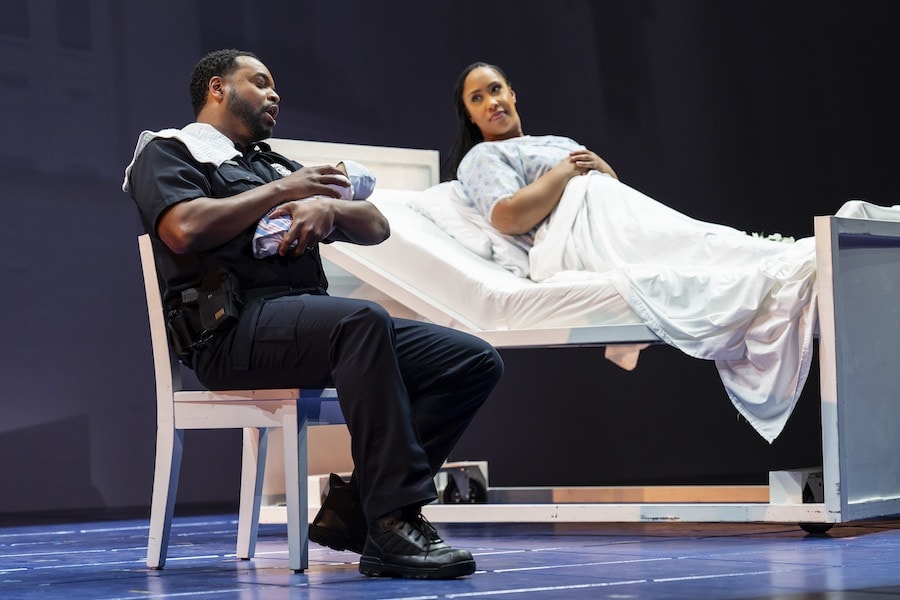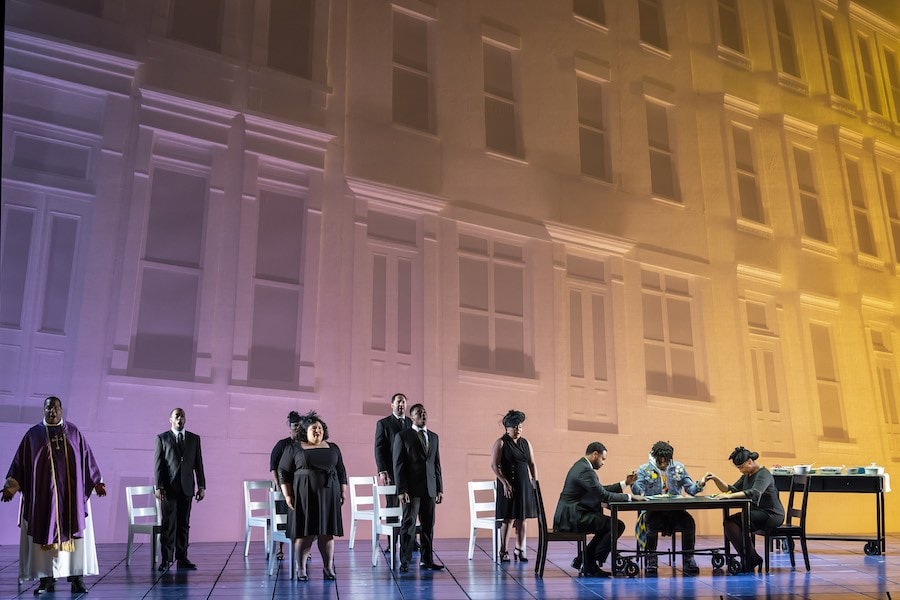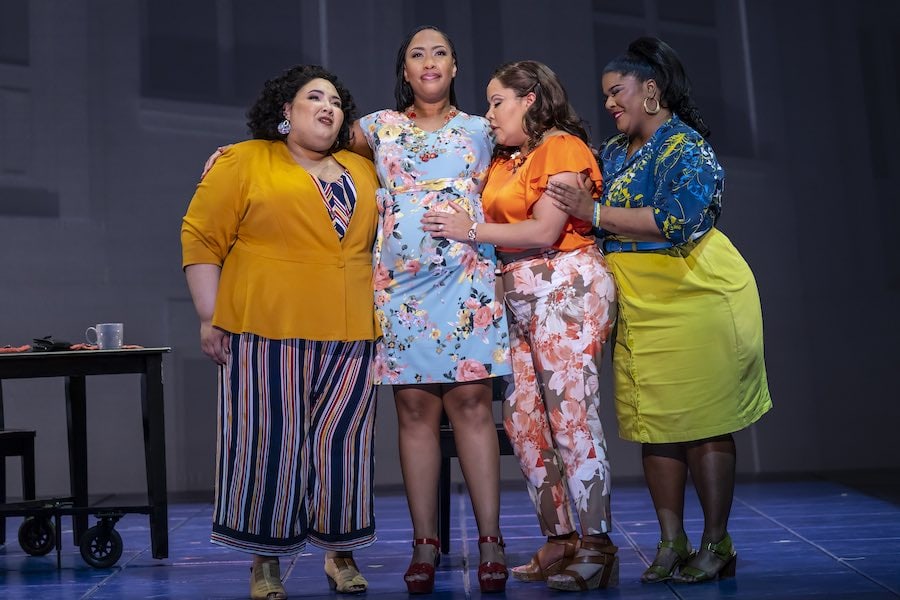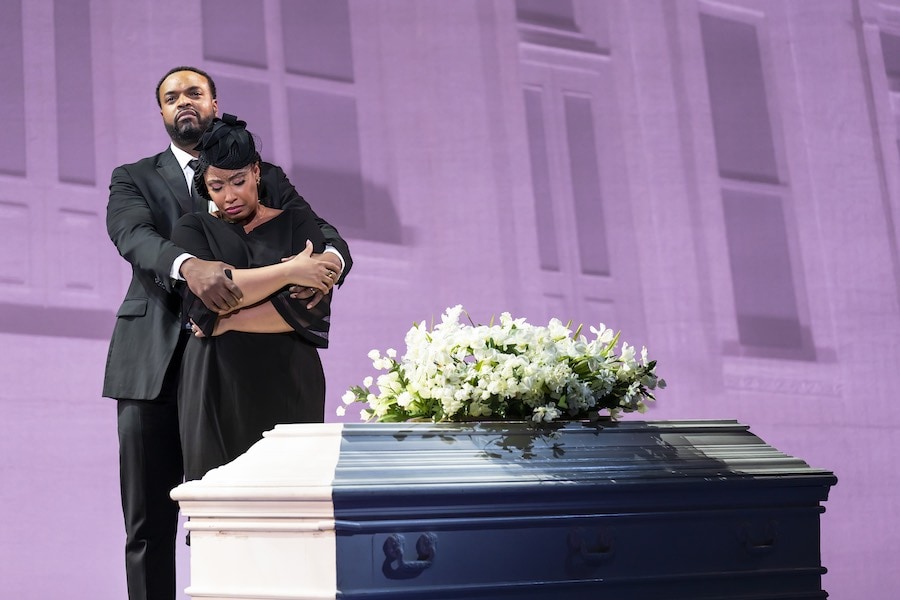“What I’ve really not seen and not experienced is African American family life when it’s OK. When there’s prosperity, when there’s abundance.” — Jeanine Tesori, composer of Blue
“Thou shalt bring forth no Black boys into this world.” — sung by the chorus of Girlfriends in Blue, libretto by Tazewell Thompson

For as long as the United States of America has existed, it has violently insisted that the story of the New World — the United States of America and all lands to the west of the Atlantic Ocean — belongs to white men exclusively. Opera’s existence has similarly been a story of exclusion. I have often thought of opera as a gatekeeper for white supremacy, an institution that allowed only “white” performers in blackface to impersonate any “non-white” characters that the institution considered to be noble (Othello, Carmen, Aida, Madame Butterfly, etc.). At the same time, this institution promoted everyday “Black” characters (such as Monostatos in The Magic Flute) as defective or inferior beings, deserving of punishment or derision. In this way, Mozart provided us with the template of America’s favorite entertainment, the minstrel show.
Blue, the opera by Jeanine Tesori (music) and Tazewell Thompson (libretto), is thrilling and gloriously impassioned: a volatile yet buoyant work that pushes against the idea that there should be no place for global-majority (non-“white”) folks to exist in their nobility and universal humanity, in either the private imagination or public forums of the nation and the world. Blue defies the idea that there should be no space for global-majority (non-“white”) folks to have control of the telling their own stories.
Blue tells us a story that we have all heard so often through our news outlets that it has almost become a banal act of terrorism: Another African American boy is killed by a white police officer. The family and the community grieve. In this case, the boy’s father was also a police officer, giving the story an additional layer of irony.
Jeanine Tesoro, Blue’s composer says: “There was a time in opera where it was just the gods who were brought on. Then it was mortals. But then it was only some mortals. And now what we’re asking of opera is to look at all mortals…. That to me is what reparations look like. It is to acknowledge that that story does not belong to me. I participate, but Tazewell has the underlying rights. That acknowledgment is really important.”
In Blue, librettist Thompson has given us a textbook “Greek” tragedy that is appropriately populated with archetypal representatives of humanity: The Father (Kenneth Kellogg), The Mother (Briana Hunter), The Son (Aaron Crouch). How this social atom functions within the society in which it is enmeshed is the focus of this work. Newspapers and politicians often cherry-pick and sensationalize the dysfunction of Black people for increased votes and ratings. They rarely consider how it is that in the face of a system that is determined to undermine Black people’s survival, Black folk nevertheless survive. They rarely note, as Nina Simone does when she reminds young Black people, that “your soul’s intact.”

Blue is set in 21st-century Harlem, and as the story unfolds, we see the cultural safety net that exists and successfully supports the lives of African Americans. This safety net is embodied in another set of archetypes: The Reverend (Joshua Conyers); a three-person female chorus, The Girlfriends/Congregants (Adriana Wehr, Katerina Burton, and Rehanna Thelwell); and a three-person male chorus, The Policemen/Male Congregants (Camron Gray, Jonathan Pierce Rhodes, and Christian Simmons).
This chorus of citizens is there to mark and honor every milestone in the lives of the family that is at the center of this drama. It is the presence of this chorus that gives the lives of this family — and, by extension, the lives of the African American people in our broader citizenry that these characters represent — support and context for the expression of their humanity.
It’s not an overstatement or simplification to say that the imposition of the filter of “race” onto human interaction (along with the genocide of its indigenous inhabitants) is the American tragedy. As if to emphasize and clarify this point, Thompson’s libretto removes the story from the sensationalism of the marketplace news cycle and returns us to a trance-inducing, rhythmic ritual that sits at the heart of tragedy and of opera. Blue unfolds like a ritual with which we are all familiar, the steps of which we know by heart: The Mother’s annunciation. The birth of the only begotten Son. The conflict between the state and the Son. The state-sanctioned killing of the Son. The helpless Father’s rage against God for failing to deliver justice. The consoling of the bereaved Mother. The communal grief in the face of repeated suffering.

The first act, though, is filled with laughter. This is surprising, since we already know and anticipate the tragedy that is to come. It is all the more surprising because this is not the type of laughter that is forced. In the first scene, for instance, a chorus of women has gathered again after having been apart from one another for a long time. The gathering of women together is a universal trope: it crosses cultures. Everyone in the audience recognizes this event and has expectations for it. During this gathering The Mother shares with her chorus of girlfriends what her husband, the father of her expected child is like:
The Mother: Everything about him is big.
(At this point the entire audience is waiting to hear what else about him is big. But Thompson, the librettist, takes his time.)
The Mother: Big frame, big smile, big eyes, big ears,
(Until finally, a member of the chorus cuts to the chase:)
Girlfriend 2: What’s his shoe size?
Mother: Sixteen
Girlfriends 1,2 and 3: Lord!
The shared laughter that erupted throughout the theater at this pronouncement, and the chorus’s reaction to it, was immediate and spontaneous. Such laughter alternated with moments of tenderness throughout the first act. Then there was a 25-minute intermission. Good for the performers to rest. Good for the audience to think about what was in that laughter and tenderness we had shared. We could also think about how no tragedy or trauma happened in the first act. And now we were preparing to return to our seats and watch a young Black man be killed just like we’ve seen on TV so often: we prepared ourselves to be retraumatized. But that didn’t happen.
One of the things about classic Greek tragedy is that the trauma occurs offstage. Jocasta hangs herself offstage. Oedipus pokes out his eyes offstage. Pentheus is torn apart offstage. Sensationalism has never been the purpose of this work we call tragedy. Its purpose has always been to give us the courage to look at the things we don’t want to look at in our society, and make necessary changes.

The rest of the opera focuses on the integrity and health of the community: how it picks itself up and puts itself back together again, even with the knowledge that unless something changes, this scenario will continue to repeat itself.
Reverend: What more to say.
We’ve said it all.
Let the church say Amen.
All congregants: Amen.
Thompson’s libretto is a vibrant, rhythmic spoken-word piece. It is an aural delight that runs in tandem with the music. The two forms fit together and wrestle with each other in a delightful way. The language is rhythmic, repetitious. Often it is something you can comfortably tap your foot or nod your head to, if not dance to. The music, rather than contradicting the audience’s impulse, or pushing it, instead runs alongside the audience’s propensities and encourages our comfortable participation.
The imposing set is a stark backdrop of middle-class apartment buildings in Harlem, New York. This remains the background regardless of where the scene is set. The windows of the building are sometimes lighted from within. Sometimes just the façade of the building is washed with light. This massive backdrop effectively embodies the overwhelming weight that these citizens are living under and by which they are enclosed.
Thompson’s direction is fluid and expressive, furthering the implications of the words, contributing to the sense of ritual. This is staging that focuses our attention on the subtext of the script rather than on the physical demands of the singer. The audience can enter the drama as well as be impressed by the vocal craft of the performers. The instrumental transitions are intentionally married to the scene changing, which is seamlessly integrated so that more often than not it plays as an emotional shift rather than mere furniture moving.
The three performers who comprise the nuclear family live up to their archetypal roles. Kenneth Kellogg has a voice of range and expressiveness that is not merely technical. Tesori’s score gives him sudden shifts to the extremes of the musical scale. Kellogg manages everyone within the context of a solid father figure. He’s everything one wants in a daddy. Briana Hunter’s Mother is a match in every way for Kellogg’s Father. Her voice is supple and always assured, persistent and dramatically apt. Aaron Crouch’s Son is adorable. His final moments onstage, which close out the opera, are heart-rending.
Running Time: Two hours and 15 minutes plus a 25-minute intermission.
The opera Blue, produced by Washington National Opera, plays to March 25, 2023, in the Eisenhower Theater at the John F. Kennedy Center for the Performing Arts, 2700 F Street NW, Washington, DC. Tickets ($35–$199) are available at the box office, online, or by calling (202) 467-4600 or (800) 444-1324.
The program for Blue is online here.
COVID Safety: Masks are optional in all Kennedy Center spaces for visitors and staff. If you prefer to wear a mask, you are welcome to do so. See Kennedy Center’s complete COVID Safety Plan here.
Blue
Music by Jeanine Tesori / Libretto by Tazewell Thompson
In English with Projected English Titles
Co-Produced with The Glimmerglass Festival and Lyric Opera of Chicago
CAST
The Father: Kenneth Kellogg
The Mother: Briana Hunter
The Son: Aaron Crouch
The Reverend: Joshua Conyers
Girlfriend 1/Congregant 1/ Nurse: Ariana Wehr
Girlfriend 1/Congregant 2: Katerina Burton
Girlfriend 1/Congregant 3: Rehanna Thelwell
Policeman 1/Male Congregant 1: Camron Gray
Policeman 1/Male Congregant 2: Jonathan Pierce Rhodes
Policeman 1/Male Congregant 3: Christian Simmons
CREW AND CREATIVE TEAM
Conductors: Joseph Young, Jonathan Taylor Rush
Director: Tazewell Thompson
Associate Director: Cindy C. Oxberry
Set Designer: Donald Eastman
Costume Designer: Jessica Jahn
Lighting Designer: Robert Wierzel
Sound Designers: Kai Harada, Haley Parcher
Hair and Makeup Designer: Anika Seitu
Surtitles: Kelley Rourke
Cover Conductor: Kevin Miller
Assistant Conductors: Michael Baitzer, Nicole Cloutier
Assistant Director: Joshua Horowitz
Stage Manager: Diane Lin

SEE ALSO:
‘We’ve sweated blood for this work’: Briana Hunter on performing in ‘Blue’ (interview by Susan Galbraith, March 7, 2023)




